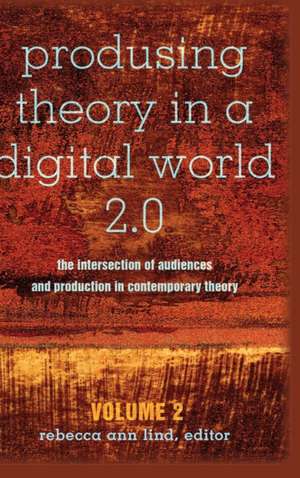Produsing Theory in a Digital World 2.0: Digital Formations, cartea 99
Editat de Rebecca Ann Linden Limba Engleză Hardback – 24 aug 2015
Din seria Digital Formations
- 20%
 Preț: 352.99 lei
Preț: 352.99 lei - 20%
 Preț: 1255.38 lei
Preț: 1255.38 lei - 20%
 Preț: 422.67 lei
Preț: 422.67 lei - 20%
 Preț: 377.42 lei
Preț: 377.42 lei - 27%
 Preț: 949.37 lei
Preț: 949.37 lei - 9%
 Preț: 747.04 lei
Preț: 747.04 lei -
 Preț: 329.15 lei
Preț: 329.15 lei - 27%
 Preț: 934.61 lei
Preț: 934.61 lei - 9%
 Preț: 682.04 lei
Preț: 682.04 lei - 27%
 Preț: 883.69 lei
Preț: 883.69 lei - 20%
 Preț: 377.24 lei
Preț: 377.24 lei - 23%
 Preț: 458.12 lei
Preț: 458.12 lei -
 Preț: 499.24 lei
Preț: 499.24 lei -
 Preț: 248.38 lei
Preț: 248.38 lei - 9%
 Preț: 783.42 lei
Preț: 783.42 lei - 20%
 Preț: 351.86 lei
Preț: 351.86 lei - 20%
 Preț: 430.92 lei
Preț: 430.92 lei - 23%
 Preț: 705.46 lei
Preț: 705.46 lei -
 Preț: 240.89 lei
Preț: 240.89 lei - 23%
 Preț: 907.55 lei
Preț: 907.55 lei - 20%
 Preț: 754.73 lei
Preț: 754.73 lei - 20%
 Preț: 320.29 lei
Preț: 320.29 lei - 20%
 Preț: 429.43 lei
Preț: 429.43 lei - 9%
 Preț: 735.32 lei
Preț: 735.32 lei - 27%
 Preț: 1140.65 lei
Preț: 1140.65 lei - 20%
 Preț: 430.09 lei
Preț: 430.09 lei - 8%
 Preț: 559.49 lei
Preț: 559.49 lei - 27%
 Preț: 894.94 lei
Preț: 894.94 lei - 20%
 Preț: 338.61 lei
Preț: 338.61 lei - 9%
 Preț: 789.53 lei
Preț: 789.53 lei - 23%
 Preț: 788.53 lei
Preț: 788.53 lei -
 Preț: 364.56 lei
Preț: 364.56 lei - 23%
 Preț: 924.04 lei
Preț: 924.04 lei - 27%
 Preț: 949.10 lei
Preț: 949.10 lei -
 Preț: 430.67 lei
Preț: 430.67 lei - 27%
 Preț: 1064.99 lei
Preț: 1064.99 lei - 27%
 Preț: 1064.54 lei
Preț: 1064.54 lei
Preț: 1064.99 lei
Preț vechi: 1458.89 lei
-27% Nou
Puncte Express: 1597
Preț estimativ în valută:
203.79€ • 217.92$ • 169.91£
203.79€ • 217.92$ • 169.91£
Carte tipărită la comandă
Livrare economică 17 aprilie-01 mai
Preluare comenzi: 021 569.72.76
Specificații
ISBN-13: 9781433127298
ISBN-10: 1433127296
Pagini: 299
Dimensiuni: 155 x 231 x 23 mm
Greutate: 0.52 kg
Ediția:2. Auflage.
Editura: Peter Lang Gmbh, Internationaler Verlag Der W
Seriile Digital Formations, Digital Formations (Hardcover)
ISBN-10: 1433127296
Pagini: 299
Dimensiuni: 155 x 231 x 23 mm
Greutate: 0.52 kg
Ediția:2. Auflage.
Editura: Peter Lang Gmbh, Internationaler Verlag Der W
Seriile Digital Formations, Digital Formations (Hardcover)
Notă biografică
Rebecca Ann Lind (PhD, University of Minnesota) is Associate Professor of Communication and Associate Dean of the College of Liberal Arts and Sciences at the University of Illinois at Chicago. She has published on race, gender, class, and media; new media studies; media ethics; and media audiences.
Cuprins
Contents: Rebbecca Ann Lind: Produsing Theory in a Digital World: Life in the Interstices ¿ Thomas R. Lindlof: The Interpretive Community Redux: The Once and Future Saga of a Media Studies Concept ¿ Dmitry Epstein: Duality Squared: On Structuration of Internet Governance ¿ Heremy Hunsinger: Produsing the Hidden: Darknet Consummativities ¿ Bradley W. Gorham/Jaime R. Riccio: Online Performative Identity Theory: A Preliminary Model for Social Mediäs Impact on Adolescent Identity Formation ¿ John V. Pavlik: Understanding the Popularity of Social Media: Flow Theory, Optimal Experience, and Public Media Engagement ¿ Nicholas David Bowman: «For this much work, I need a Guild card!»: Video Gameplay as a (Demanding) Coproduction ¿ Philip M. Napoli/Jonathan A. Obar: The Mobile Conversion, Internet Regression, and the Repassification of the Media Audience ¿ Darryl Woodford/Ben Goldsmith/Axel Bruns: Social Media Audience Metrics as a New Form of TV Audience Measurement ¿ Radhika Gajjala/Dinah Tetteh/Anca Birzescu: Staging the Subaltern Self and the Subaltern Other: Digital Labor and Digital Leisure in ICT4D ¿ Kishonna L. Gray: Race, Gender, and Virtual Inequality: Exploring the Liberatory Potential of Black Cyberfeminist Theory ¿ Ella McPherson: Digital Human Rights Reporting by Civilian Witnesses: Surmounting the Verification Barrier ¿ Renee Hobbs: Twitter as a Pedagogical Tool in Higher Education ¿ Heidi Vandebosch/Philippe C. G. Adam/Kath Albury/Sara Bastiaensens/John De Wit/Stephanie Hemelryk Donald/Kathleen Van Royen/Anne Vermeulen: Engaging Adolescents in Narrative Research and Interventions on Cyberbullying ¿ Annette N. Markham: Produsing Ethics [for the Digital Near Future] ¿ Dennis K. Davis: Afterword: What¿s So New About New Media?
